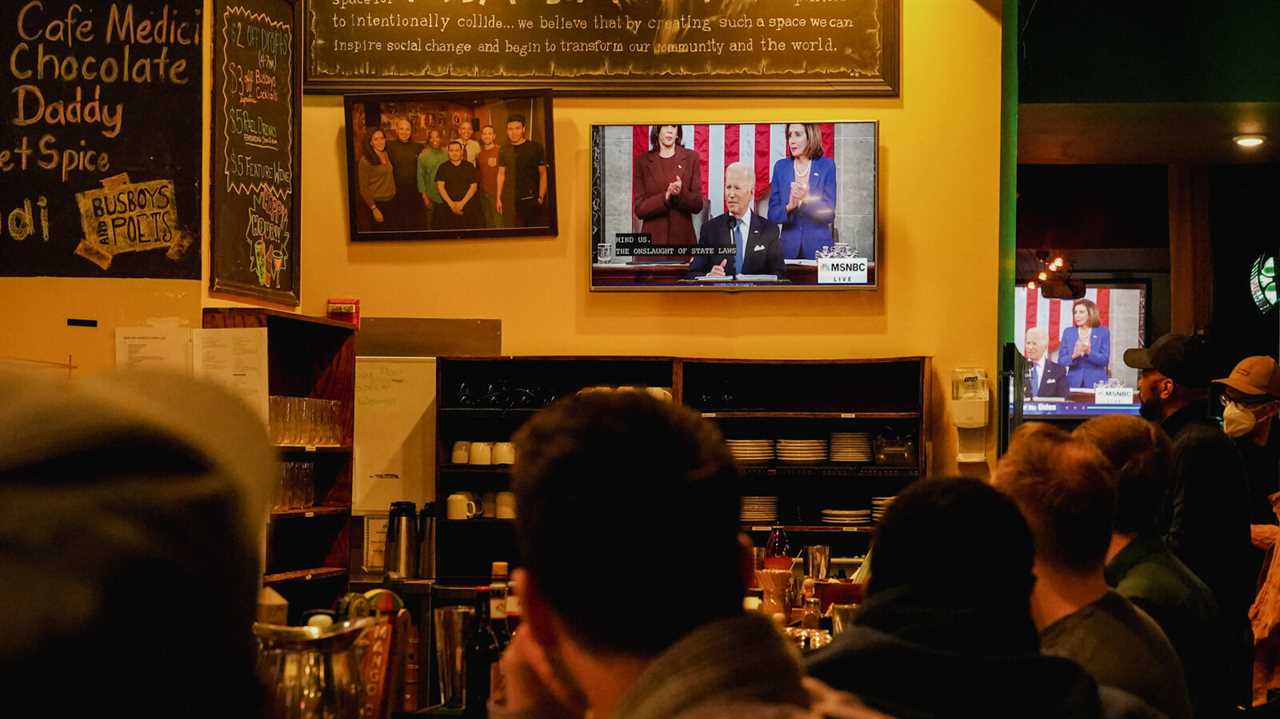
Few notions are as ingrained in political punditry as the idea that foreign crises unite Americans behind their president. It’s called the “rally ’round the flag effect” and it’s been taken as fact by commentators and chased by White Houses for decades.But it’s also something of a political urban legend. While there are examples of presidents seeing a public approval boost during a crisis, there is also evidence that the improvements are minimal and fleeting — and perhaps getting less common in our hyperpolarized politics.That hasn’t kept presidents from trying. On Tuesday night, President Biden used his State of the Union address to call on Congress to stand with him to condemn the invasion of Ukraine commanded by President Vladimir Putin of Russia. “He thought he could divide us here at home,” Biden said. “Putin was wrong.”On one level, the president was right: Biden does have solid bipartisan backing for his policy of isolating Russia while backing Ukraine.Foreign policy experts of all types have praised the administration for its deft handling of European politics, which has resulted in crippling sanctions on Russian oligarchs and financial institutions, and for its use of intelligence to expose Kremlin designs on Ukraine.And though many questions about U.S. strategy remain unanswered, even Senator Mitch McConnell, the top Republican in the Senate, said on Tuesday that there was “broad support for the president for what he’s doing now.”But Democrats expecting voters in both parties to give Biden credit are likely hoping in vain.“If the crisis is just fodder for the usual partisan debate, then there’s not much chance the president will see his approval rating increase much,” said John Sides, a political scientist at Vanderbilt University.The rally effect
The term “rally ’round the flag effect” was coined by John Mueller, a political scientist who studied the relationship between presidents’ actions and public opinion.In a 1970 paper, Mueller argued that under certain conditions, many voters will shed their partisan allegiances during foreign policy crises and support the commander in chief.The concept became conventional wisdom in the years that followed — and seemed to be borne out during conflicts like the Persian Gulf war of 1991, when President George H.W. Bush saw his approval rating zoom up.It even inspired a movie: “Wag the Dog,” a 1997 comedy in which a cynical political operative fabricates a war in Albania to divert attention from a presidential sex scandal. The phrase “wagging the dog” has since become pundits’ shorthand for the notion that a president can distract the public from troubles back home by focusing on a conflict overseas.More recent scholarship, however, has found the rally effect to be minimal.In 1995, when scholars John R. Oneal and Anna Lillian Bryan crunched the numbers for 41 foreign policy crises between 1950 and 1985, they found that the average change in the president’s approval rating was just 1.4 percent. (Interestingly, one variable they tracked was coverage in The New York Times, and specifically whether the crisis made the front page.)ImageProtesters against the Russian invasion of Ukraine gathered outside the White House on Tuesday.Credit...Valerie Plesch for The New York TimesSince then, American politics has gotten even more polarized — meaning that voters’ views about the president are more likely to be set and approval ratings don’t bounce around as much as they once did. Donald Trump’s approval ratings were remarkably stable, for instance, despite a presidency marked by overwhelmingly negative press coverage. During his first two years in office, Jimmy Carter’s approval ratings fluctuated by 36 percentage points. Trump’s stayed within a band of 10 percentage points.Part of what’s going on here, according to researchers who study public opinion, is that Republicans tend to stand by their own leaders, while also being predisposed to judge Democratic presidents harshly.“Republicans have always been less inclined to rally behind a Democratic president than Democrats have been to rally behind a Republican president in times of crisis,” said Matthew Baum, a professor of global communications at the Harvard Kennedy School.Baum has found that when a Republican is president during a foreign crisis, the average boost in approval rating among Democrats is nearly 8 percent. But when a Democrat is president, the rally effects are “smaller and insignificant,” he wrote in a 2002 paper. Those figures included George W. Bush, who experienced a 35 percentage-point boost in support after Sept. 11.“It’s a little challenging to make the comparison for specific events, since each conflict is different,”By: Blake Hounshell and Leah Askarinam
Title: Why Americans Might Not Rally Around Biden Over Ukraine
Sourced From: www.nytimes.com/2022/03/02/us/politics/biden-ukraine-russia-policy-support.html
Published Date: Thu, 03 Mar 2022 00:00:05 +0000
Read More
Did you miss our previous article...
https://badpoliticians.com/us-politics/judge-jackson-begins-to-make-her-own-case-for-the-high-court-seat
 UK PoliticsWorld PoliticsVideosPrivacy PolicyTerms And Conditions
UK PoliticsWorld PoliticsVideosPrivacy PolicyTerms And Conditions
